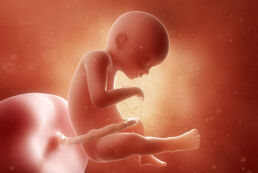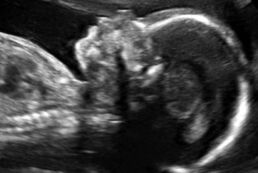Baby's Height and Weight
In the 21st week of pregnancy, the baby is about 26-27 centimeters tall, the size of a carrot. Is weight is about 360 grams.
Development of the Baby

In the 21st gestational week, you are halfway through your pregnancy and, very interestingly, your baby is half the size of the neck it will be born.
In the womb, the 21-week-old baby’s digestive system will begin to absorb energy-boosting nutrients from the amniotic fluid it ingests. But on the one hand, most of the baby’s nutritional needs are still met through the placenta.
At 21 week’s pregnancy, the space is still wide, so she can hang out in there as she pleases. For this reason, you can feel their kicks at different points.
Their skin is now completely covered with a layer of vernix caseosa (vernix caseosa). Most of this special fatty structure, such as paste, which has an important role for the baby’s immune system, disappears before birth.
In the 21st week of pregnancy, the development of organs was largely completed. Bone marrow formation is also accelerating.
Your baby’s brain continues to grow rapidly, and this growth will continue for at least a few more years after birth.
At the 21st gestational week, the baby’s senses continue to develop. They are aware of your eating habits because they have developed a sense of taste. If you eat sweet foods like chocolate, they will move more. They are becoming increasingly aware of the levels of light and noise coming from outside.
Thanks to the amniotic fluid, your baby’s developmental stages continue to be completed. This liquid has the task of protecting them against impacts. The baby also breathes by filling and emptying its lungs as it swallows the amniotic fluid. This action is a preparation for herthem to breathe after birth. In addition, this fluid keeps the baby’s digestive system working.
A stool called meconium has been forming in his bowels for several weeks. They will continue to accumulate these feces in their intestines until birth. The baby is expected not to make this stool in the womb before birth.
Baby Movements at 21 Weeks Pregnancy
Movements may be felt one day and not for several days. You’ll start to feel your baby’s movements more steadily after 28 weeks.
If you put pressure on your belly with your hand, they might respond by pulling away and pushing you back.
Ultrasound Image

Since the nose, lips and tongue are clearly visible, the face of the fetus is much clearer in 21-week gestational ultrasound images.
Their heart continues to beat even stronger. At 21 weeks of ultrasound examination, you can hear your baby’s heartbeat very strongly.
In ultrasound images at 21 weeks, the baby can sometimes be seen asleep and sometimes in motion.
Changes in the Mother's Body
How many months is 21 weeks? It is the week that coincides with the 5th month of pregnancy.
Pregnancy At 21 weeks, the doctor looks at the ratio of sugar and protein in the urine and the height of the upper part of the uterus.
Changes in the mother at the 21st week of pregnancy are as follows:
– A white discharge from the vagina,
– Pains in the lower part of the abdomen,
– Constipation and leg cramps,
– Burning, indigestion and gas problem in the stomach,
– Changes in the abdomen and face skin color,
– Acceleration in heart rate as blood pressure will increase,
– Headaches and feeling faint.
The placenta, which provides nutrients and oxygen to the baby, is expected to be in line with the baby and at the level of the middle abdomen at the 21st week of pregnancy. Close to the midline and below, the placenta is likely to rise between 24-32 weeks. If it is too low, it is called Placenta Previa, and if the placenta stands in front of the birth canal, it is a condition that prevents the mother from giving birth normally. In such a case, giving birth normally may cause excessive blood loss and negative situations in the expectant mother. In cases where the placenta is below, bleeding may occur in some expectant mothers, mostly between 34-38 weeks. In this case, the doctor who follows the expectant mother should be informed. If the placenta does not obstruct the birth canal, if labor has begun and there is not much bleeding, normal delivery may occur.
Points need to be considered
Increased blood in your bloodstream; as it will press against the mucous membranes and veins; causes feelings of fainting, nasal congestion, hot flushes and more frequent sweating. If there is also a feeling of dizziness and faintness, you should pay attention to:
– It may cause low blood sugar, dizziness and a feeling of faintness. In order not to allow your blood sugar to drop, be careful not to be hungry, do not skip your meals and snack on healthy foods at snacks. Always have foods such as walnuts, hazelnuts, almonds, fresh fruits and dried fruits with you that will suppress your hunger,
– Get out into the fresh air,
– If you are available, lie down and lift your feet in the air,
– Get up slowly and calmly as you get up from where you sit and lie down,
– If you encounter such situations, inform your doctor afterwards.
Nutrition at 21 Weeks Pregnancy
you may hear phrases like “You’re pregnant, you should eat for two” from your environment. Don’t believe it, even if you have a lot of appetite. It is enough to consume 300 calories more than normal for the first 6 months of pregnancy. This amount can be 500-600 calories for those who are expecting a twin baby. In the last 3 months, you can consume 600-800 calories more than normal. This amount may also increase in twin pregnancies. In a normal pregnancy, it will be unnecessary to consume more than 2000 calories a day and it will return to you as excess weight.
If you eat healthy and natural foods, you will be rich in vitamins and minerals you need. You should drink at least 8-10 glasses of water a day.
Avoid caffeinated beverages. If you have a pre-pregnancy coffee habit, get it under control throughout your pregnancy. Because caffeine negatively affects the absorption of vitamin C, calcium and iron.
You should also be protected from food poisoning during pregnancy. For this, you should pay attention to:
– Pay attention to the salmonella bacteria found in eggs and chickens. Consume these foods cooked. If you handle it raw, wash your hands and the surfaces they touch very well,
– Do not consume unpasteurized milk and dairy products. There is a risk of listeria bacteria transmission from such foods and this can be life-threatening for the baby,
– You should also be wary of toxoplasma. It is a parasite that occurs in animal droppings, especially cat droppings. Do not consume uncooked or undercooked meat, as it can also be transmitted from raw meat. Wash vegetables and fruits thoroughly,
– Wash your hands thoroughly before and after preparing food.
Canbebe on Social Media!
Join our community of mothers and fathers on social media. Be close to caring community, sharing advices between each other on our everyday life with our baby.
